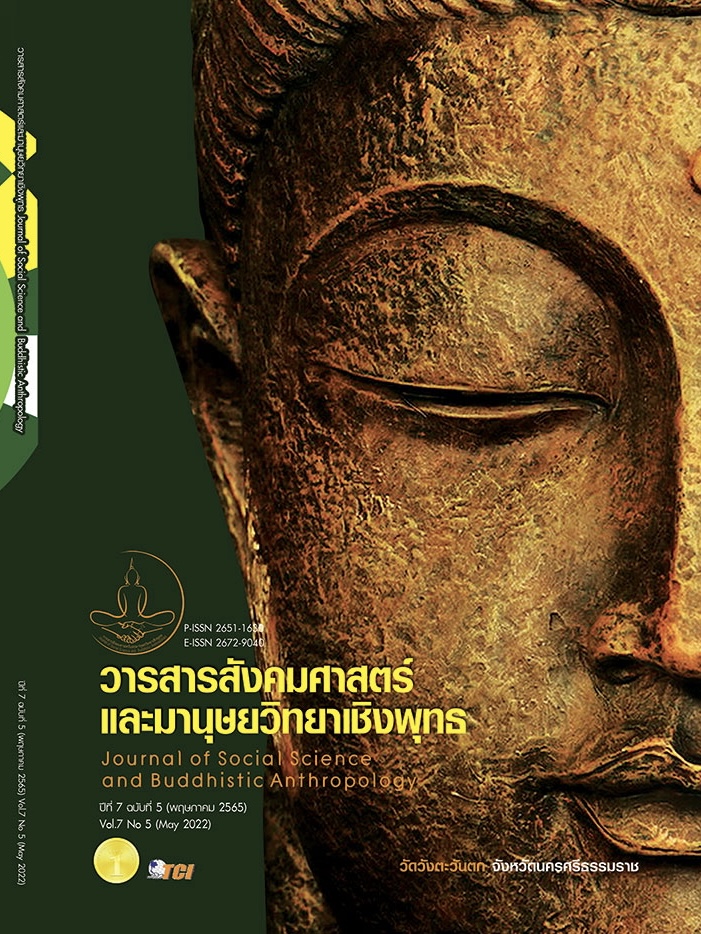APPLING 5 GOODNESS’S PRINCIPLE OF VEN.BUDDHADASA BHIKKHU TO GUIDE ONESELF AND SOCIETY FOR SELF DEVELOPMENT
Keywords:
Applying 5 Goodness’s Principle, Ven.Buddhadahsa Bhikkhu’s, Guidance of Oneself and Society, Self-DevelopmentAbstract
The objectives of this research were to 1) study and analyze the 5 goodness’s principle to guide oneself and Society 2) study and analyze the processes and methods of guidance and 3) study and analyze the applying 5 goodness’s principle of Ven.Buddhadahsa Bhikkhu to guide oneself and Society for self-development. This research was conducted in area of Suratthani province by qualitative research methodology. The data were collected from 8 key informants by Indept-interview and from 7 participants by focus group discussion. The data from both means were analyzed by content analysis. The results of this research showed that 1) Ven.Buddhadahsa Bhikkhu had guided everyone in every statue to respect, obey and be grateful to benefactors 2) There were 5 processes for guidance of Ven.Buddhadahsa Bhikkhu, i.e. individual data collection service, information service, counseling service, placement service and follow up service but the methods for guidance of Ven.Buddhadahsa Bhikkhu consisted of guiding with word, with doing to show, living to see and by showing happiness to see 3) To apply 5 goodness’s principle of Ven.Buddhadahsa Bhikkhu to guide oneself and Society can be concluded in 3 points i.e. first, parent and teachers had to be good model in matter of gratitude and cultivate child for to be good boy through Socialization process, second, in kindergarten level teacher should use activities of the funny fables about virtue, for in primary school and secondary school, the teachers should use teaching activities in form of Constructivism to let childe thinking good and being good person third, administrative offices should develop curriculum of Ven.Buddhadahsa Bhikkhu or 5 goodness’s principle to be modern for using, they had to have a budget for development of teachers.
References
เกียรติศักดิ์ ดวงจันทร์. (2560). การประยุกต์ใช้คำสอนของพุทธทาสภิกขุของบุคคลผู้ประสบความสำเร็จในชีวิตพื้นที่อ่าวบ้านดอน จังหวัดสุราษฎร์ธานี. วารสารนิติศาสตร์และสังคมท้องถิ่น, 4(2), 139-158.
ดลใจ ถาวรวงศ์ ตันเจริญ และจันทร์ชลี มาพุทธ. (2552). กระบวนการขัดเกลาคุณธรรมจริยธรรมของเยาวชนต้นแบบ จังหวัดฉะเชิงเทรา. วารสารการศึกษาและการพัฒนาสังคม, 10(1), 35-45.
นารีลักษณ์ ธีระวัฒนะชาติ และสพลณภัทร ศรีแสนยงค์. (2557). การสร้างชุดกิจกรรมการเรียนรู้เพื่อพัฒนาคุณธรรม จริยธรรมของนักเรียน ชั้นมัธยมศึกษาปีที่ 4 ที่เรียนวิชาสังคมศึกษา เรื่อง พลเมืองดี โดยใช้รูปแบบ การเรียนการสอนตามแนวทฤษฎีการสร้างองค์ความรู้ด้วยตนเอง. วารสารการศึกษาและการพัฒนาสังคม, 10(1), 35-45.
นิรันดร์ จุลทรัพย์. (2554). การแนะแนวเบื้องต้น. (พิมพ์ครั้งที่ 4). สงขลา: ภารกิจเอกสารและตำรามหาวิทยาลัยทักษิณ.
ผู้ให้สัมภาษณ์คนที่ 1. (15 สิงหาคม 2563). ด้านพ่อแม่. (สมเจตน์ ผิวทองงาม, ผู้สัมภาษณ์)
ผู้ให้สัมภาษณ์คนที่ 2. (27 สิงหาคม 2563). ด้านโรงเรียน. (สมเจตน์ ผิวทองงาม, ผู้สัมภาษณ์)
ผู้ให้สัมภาษณ์คนที่ 3. (30 สิงหาคม 2563). ด้านหน่วยงานที่เกี่ยวข้องกับการศึกษา. (สมเจตน์ ผิวทองงาม, ผู้สัมภาษณ์)
พระพรหมคุณาภรณ์ (ป.อ.ปยุตโต). (2554). ธรรมนูญชีวิต. กรุงเทพมหานคร: โรงพิมพ์พระพุทธศาสนาแห่งธรรมสภา.
พระมหาสายัณห์ วงศ์สุรินทร์. (2549). การแนะแนวในพระพุทธศาสนา: วิเคราะห์พระสุตตันตปิฎก. ใน วิทยานิพนธ์ศึกษาศาสตรมหาบัณฑิต สาขาจิตวิทยาการแนะแนว. มหาวิทยาลัยนเรศวร.
พุทธทาสภิกขุ. (2537). ธรรมโฆษณ์ชุดเยาวชนกับศีลธรรม. สุราษฎร์ธานี: ธรรมทานมูลนิธิ.
พุทธทาสภิกขุ. (2545). ยุวธรรมสำหรับเยาวชน. กรุงเทพมหานคร: สุขภาพใจ.
ลักขณา สริวัฒน์. (2543). การแนะแนวเบื้องต้น. กรุงเทพมหานคร: สำนักพิมพ์ โอเดียนสโตร์.
วิชิตวงศ์ ณ ป้อมเพชร. (2553). ปฏิรูปการศึกษา แนวคิด และข้อเสนอแนะ. (พิมพ์ครั้งที่ 1). กรุงเทพมหานคร: บริษัท วศิระ จำกัด.
สมฤดี จันทร์กล่ำ. (2563). การดำเนินชีวิตตามหลักทิศ 6 ในพุทธปรัชญาเถรวาท. ใน วิทยานิพนธ์ศาสนศาสตรมหาบัณฑิต สาขาวิชาพุทธศาสนาและปรัชญา. มหาวิทยาลัยมหามกุฏราชวิทยาลัย.
สุมณฑา สวนผลรัตน์. (2550). การสร้างชุดกิจกรรมแนะแนวเพื่อพัฒนาคุณธรรมจริยธรรมของนักเรียนช่วงชั้นปีที่ 3. ใน สารนิพนธ์การศึกษามหาบัณฑิต สาขาจิตวิทยาและการแนะแนว. มหาวิทยาลัยศรีนครินทรวิโรฒ.
อาภา ถนัดช่าง. (2539). การแนะแนวกับการปฏิรูปการศึกษา. วารสารแนะแนว, 30(161), 19-24.
อำนวย ยัสโยธา. (2564). พุทธทาสภิกขุ : โลกทัศน์ทางปรัชญากับการศึกษาแบบ “หมาหางด้วน. Journal of Social Science and Humanities Research in Asia, 27(1), 3-34.
Downloads
Published
How to Cite
Issue
Section
License
Copyright (c) 2022 Journal of Social Science and Buddhistic Anthropology

This work is licensed under a Creative Commons Attribution-NonCommercial-NoDerivatives 4.0 International License.









